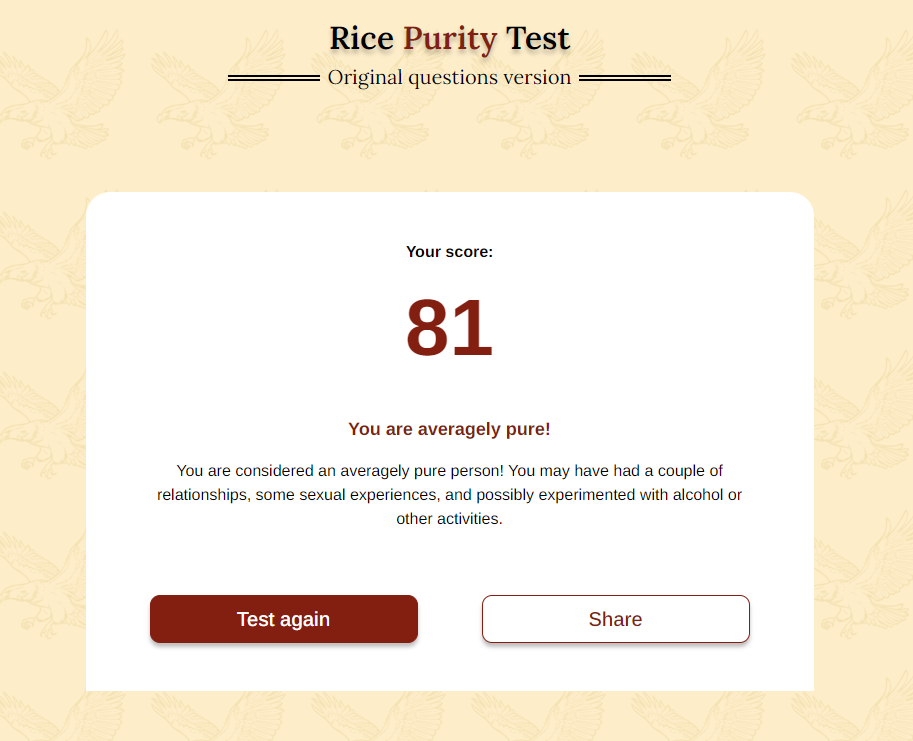Effects of Rice Purity Scores on the Mind
- ricepuritytestio
- 7 thg 8, 2024
- 3 phút đọc
The Rice Purity Test is very popular among young adults, especially university students, who use it to assess their life experiences and innocence. While the exam is commonly done for amusement, it has deeper psychological implications that deserve to be explored.

Understanding The Rice Purity Test
The Rice Purity Test was created with the goal of creating a fun test to encourage Rice University students to share their experiences and bond more. It consists of 100 questions about personal experiences such as academic dishonesty, substance usage, sexual activity, and other life events. Testers are given a score from 0 to 100, with higher values signifying greater purity or innocence.
One of the most important psychological elements of the Rice Purity Test is its ability to provide a quantitative self-assessment. Humans have a natural drive to understand themselves and their place within social organizations. Individuals can develop a sense of identity and compare themselves to their peers by giving numerical values to their experiences.
On the one hand, this comparison can help friends deepen their connections and better understand one another. On the other hand, it can instill feelings of inadequacy and pressure to adhere to perceived standards.
Psychological Impact of Rice Purity Test on Self-Perception
The Rice Purity Test, despite its simplicity, can have an impact on the psychology and self-awareness of its participants. It can have a wide range of effects depending on each individual's emotions and comprehension.
Impact on self-esteem
The score a person receives can have a big impact on their self-esteem. High scores, which indicate less life experiences, may make people feel inexperienced or protected in comparison to their peers. Lower scores, on the other hand, may lead to people seeing themselves as more worldly or, in some situations, as having made questionable life decisions.
Identity Formation
Adulthood is the time when each person's personality and identity are most firmly established. The Rice Purity Test can help in this growth period by encouraging introspection and self-reflection. After taking the test, individuals may want to attempt again or avoid the situations specified in the question in order to maintain their high score.
Social Dynamics and Group Behavior
Peer Pressure and Conformity
In social situations, particularly among college students, there is frequently an invisible pressure that forces individuals to conform and follow the crowd in order to avoid feeling out of place. When students join different groups or organizations, they may face implicit standards that they must follow, such as sharing common experiences. The Rice Purity Test may make pupils more conscious of experiences they have not yet had. This awareness might lead to a motivation to participate in behaviors just to decrease their score and better conform with social norms.
Bonding and Inclusivity
On a more positive note, sharing Rice Purity Scores can help groups bond. Discussions about test findings can foster a sense of community and inclusion. Many people use it to break the ice and start more in-depth conversations about personal values, experiences, and boundaries. By completing this test, students can connect with individuals who share their experiences and ideals.
Emotional Responses and Long-Term Behavioral Trends
When a person's purity score is low, they may experience sorrow and guilt for their past actions. Those with higher ratings, on the other hand, may be concerned about their perceived lack of experience and feel compelled to engage in specific activities in order to fit in or escape judgment from their peers.
The knowledge received from taking the Rice Purity Test may impact future behavior. For some, the test is a wake-up call, motivating them to pursue new experiences or reevaluate their life choices. Being aware of one's score and receiving social feedback might lead to long-term changes in behavior and attitude.
Sharing Rice Purity Scores in romantic relationships might spark discussions about previous experiences and future expectations. This transparency can either build the relationship by being honest and empathetic, or it can pose issues if there is a substantial disparity between ratings and the experiences they represent.
Cultural and Social Perspectives
Cultural Differences in Interpretation
The interpretation of Rice Purity Scores varies substantially among cultures. What is considered innocent or experienced in one cultural setting may not be the same in another. These cultural perceptions influence how people see their scores and the behaviors that go with them.
Social Norms and Expectations
Social conventions have a significant impact on how Rice Purity Scores are interpreted. A higher score may be perceived positively in conservative communities, whilst a lower score may be regarded as a sign of maturity and openness in more liberal environments. These societal expectations shape how people perceive their own and others' scores.
To summarize, the Rice Purity Test, while typically treated lightheartedly, has serious psychological ramifications. It has major effects on self-perception, social dynamics, and mental health. Understanding these consequences allows us to comprehend the deeper meaning of this seemingly simple test.


Bình luận